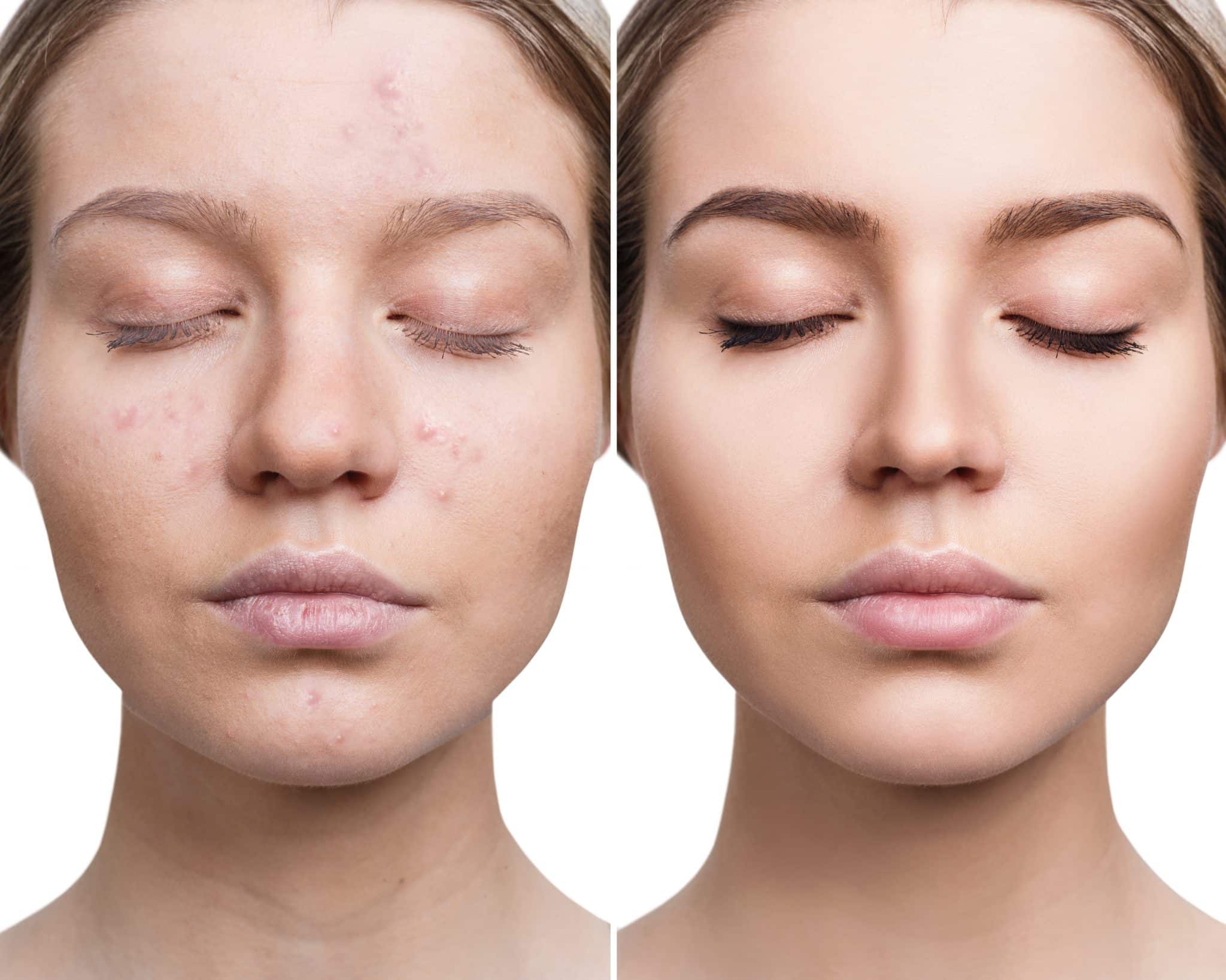Acne is a common skin condition characterized by pimples, blackheads, and whiteheads that form when hair follicles or pores become clogged with excess oil, dead skin cells, or cosmetic products.
Acne is most prevalent on the face, especially around the nose, forehead, and chin, but can reach areas including the scalp, back, and chest. Acne tends to affect teenagers experiencing puberty but can affect people of all ages.
Most acne clears up on its own, but the condition can become chronic and painful in some people.
Causes
Acne tends to crop up when the skin is irritated in some way. Conditions that can irritate the skin and cause acne include:
- Excess sebum (oil) production
- Clogged hair follicles
- Bacteria
- Inflammation
Nailing down exactly what causes acne can be difficult. Several factors can trigger or worsen acne, including:
Hormonal changes
During puberty, teens experience a spike in androgens, which cause sebaceous glands to enlarge and produce more oil, causing acne. Hormonal changes during pregnancy or menstruation can also cause acne, but it is generally not severe.
Medication
Drugs containing corticosteroids, lithium, or testosterone can exacerbate acne.
Diet
It is uncertain to what degree diet plays into acne. Several studies suggest that consuming too much sugar and processed carbohydrates causes breakouts. Other studies link dairy to acne. While diet may contribute to acne, it is usually not the primary cause.
Stress
While stress does not directly cause acne, it can worsen existing acne.
Symptoms
Acne symptoms vary based on the severity of the condition but often include:
- Papules (small red bumps)
- Pimples (pus-filled pustules)
- Whiteheads (closed clogged pores that appear as small white bumps)
- Blackheads (open clogged pores that appear dark due to oil and bacteria congestion)
- Nodules (large painful lumps under the skin)
- Cystic lesions (large pus-filled lumps under the skin)
Risks and Complications
Certain people are more susceptible to acne based on the following factors:
Age
Acne can occur at any age, but teenagers are more likely to experience the condition.
Hormonal changes
Hormonal changes are common during puberty and pregnancy. Some medications, like birth control, can also cause hormonal changes that might lead to acne.
Genetics
If you have a family history of acne, you are more likely to develop it at some point.
Friction or pressure on the skin
Frequent use of helmets and cell phones or wearing shirts with tight collars can irritate the skin and cause acne.
Sensitive skin
People with sensitive skin can develop acne after using harsh cleansers.
Treatment
Severe acne can lead to emotional distress and can cause scarring. Severe acne should be treated as soon as possible to prevent scarring.
Changes in skincare or diet habits can minimize the effects of acne. Monitor which products work best for you, and if your skin is sensitive, stay away from harsh ingredients like sulfates. Make sure to wash off any makeup before you sleep and avoid scratching or popping pimples.
If over-the-counter acne creams don’t improve your acne within a few weeks, you may need prescription medication. Speak with a doctor or dermatologist about which of the following treatments is right for you.
If interested in acne treatment and you live in Edison, NJ we are more than happy to assist you. Are you from another town in New Jersey or another city? We’ll keep providing guides, and recommendations on treatments.
Topical Medications
Retinoids
Products containing retinoic acid reduce acne by preventing pores from clogging. Popular retinoids include tretinoin (Retin-A) and adapalene (Differin). Consult your doctor about which retinoid is right for you.
Be sure to start small, as retinoids are potent and can cause skin irritation. Apply a small amount to start and increase usage gradually as your skin adapts. Ask your doctor about which products to avoid when using retinoids.
Retinoids can sensitize the skin. Always apply retinoids at night time and follow up by wearing sunscreen the next morning.
Topical Antibiotics
Topical antibiotics stave off acne by killing bacteria and soothing inflammation. Antibiotics and retinoids can be used together, but the two should be alternated, as the benzoyl peroxide in the antibiotic can interact negatively with the retinoid.
Azelaic or salicylic acid
Azelaic acid’s antibacterial properties help it fight off acne, while salicylic acid penetrates the skin to help clear out clogged pores. Avoid using too many acids together or with drying products like retinoids.
Dapsone
Dapsone gel can help heal inflammatory acne, commonly found in women.
Oral Medications
Antibiotics
If your acne is moderate to severe, your doctor may recommend an oral antibiotic to reduce bacteria. Commonly used antibiotics include tetracycline and macrolide. Antibiotics should only be used for a short period to avoid building up resistance. Side effects from antibiotics are minimal but include sun sensitivity and increased risk of yeast infection.
Anti-androgen agents
Androgen hormones can lead to acne in women and girls. Anti-androgen products stop androgen hormones from reaching the sebaceous glands that produce oil. Possible side effects include period pain and tender or swollen breasts.
Isotretinoin
Isotretinoin is a vitamin A derivative usually prescribed when other treatments prove ineffective.
Therapies
Dermatological procedures like light therapy or chemical peels can help reduce acne when combined with medication. However, most treatments require multiple sessions and can get expensive. In some cases, a dermatologist may want to extract stubborn blackheads and whiteheads, but the process can cause scarring, and results are temporary.

